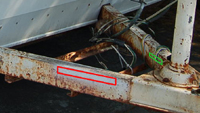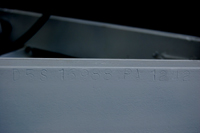|
|
If you're checking out a vintage trailer for sale, you need to thoroughly inspect it and ask the seller a lot of questions.
One of the most important details you need to confirm is that the seller has a "title" document (sometimes called a "Pink Slip"),
verifying that he/she owns the trailer. In addition, you need to make sure that the
VIN (i.e., "Vehicle Identification Number") printed on the title document, matches the VIN number attached to the trailer.
|
On vintage Shasta trailers the factory
stamped a unique VIN number

on each trailer's frame, near the tongue.
You should be able to find the VIN number stamped into the curb-side (i.e., "door side") leg of the tongue frame,
on the outside face (see the red outlined area in the photo at the right).
You should also find a small VIN plate welded to the inside face of the street-side leg of the tongue frame (the green outlined area in the photo at the right).
If this is an un-restored trailer, these numbers on the frame may be obscured by rust, dirt and peeling paint.
You may need to get up-close and use a flashlight to make out the digits. If the seller will let you, try lightly sanding the area to remove some
of the built-up gunk, and expose the numbers. If you can't find any numbers, or the numbers have been altered (filled-in, filed-off, scratched off, etc.),
or the numbers don't match the VIN number printed on the title you should probably walk away. Getting the State to help you sort out the descrepancy
will most likely be a difficult and hair-pulling experience. Worst case; this trailer is stolen and the "seller" doesn't really own it. Just walk away.
The VIN number printed on the title document may match just the digits on the welded-on plate, or it may match the longer number stamped into
the curb-side of the frame. Regardless of which way the trailer was originally titled, make sure the VIN number printed on the title matches
one of the numbers on the trailer's tongue frame.
|
|
Technically, the number on the small welded-on plate (click on the photo at the left) contains the actual VIN number assigned by the Shasta factory.
There doesn't appear to be a consistant scheme used by all of the Shasta factories thru-out the production years, for assigning these VIN numbers.
Each number is unique, but don't expect to be able to determine the trailer's month or year of manufacture, based on the VIN number.
|
The number stamped on the
curb-side of the frame

will usually be longer, incorporating the number from the welded-on plate plus some other letters and numbers (click on the photo at the right).
Generally, Shasta used the letter codes to indicate which factory location built the trailer, but de-coding the meaning of these
letters tends to be an inexact science. Some trailerites believe that the extra numbers stamped onto the curb-side of the frame may indicate the
trailer's production sequence number (it is believed that during the 60's, the Northridge plant stamped a 'PA' after the VIN and followed this 'PA'
with a sequence number, as shown in the photo) within that manufacturing plant - possibly indicating the year the trailer was built, but again that is just conjecture.
Here is a partial list of the the "Shasta Plant" letter codes you may find included in the string of characters stamped into the frame:
'C' - Built at Shasta's Van Nuys, California plant
'CA' - Built at Shasta's Van Nuys, California plant
'DS' - Built at Shasta's Northridge, California plant
'ES' - Built at Shasta's Northridge, California plant
'FS' - Built at Shasta's Northridge, California plant
'GS' - Built at Shasta's Northridge, California plant
'HS' - Built at Shasta's Northridge, California plant
'P' - Built at Shasta's Leola, Pennsylvania plant
'S' - Built at Shasta's Columbia, South Carolina plant
'T' - Built at Shasta's Grapevine, Texas plant
'V' - Built at Shasta's Goshen, Indiana plant